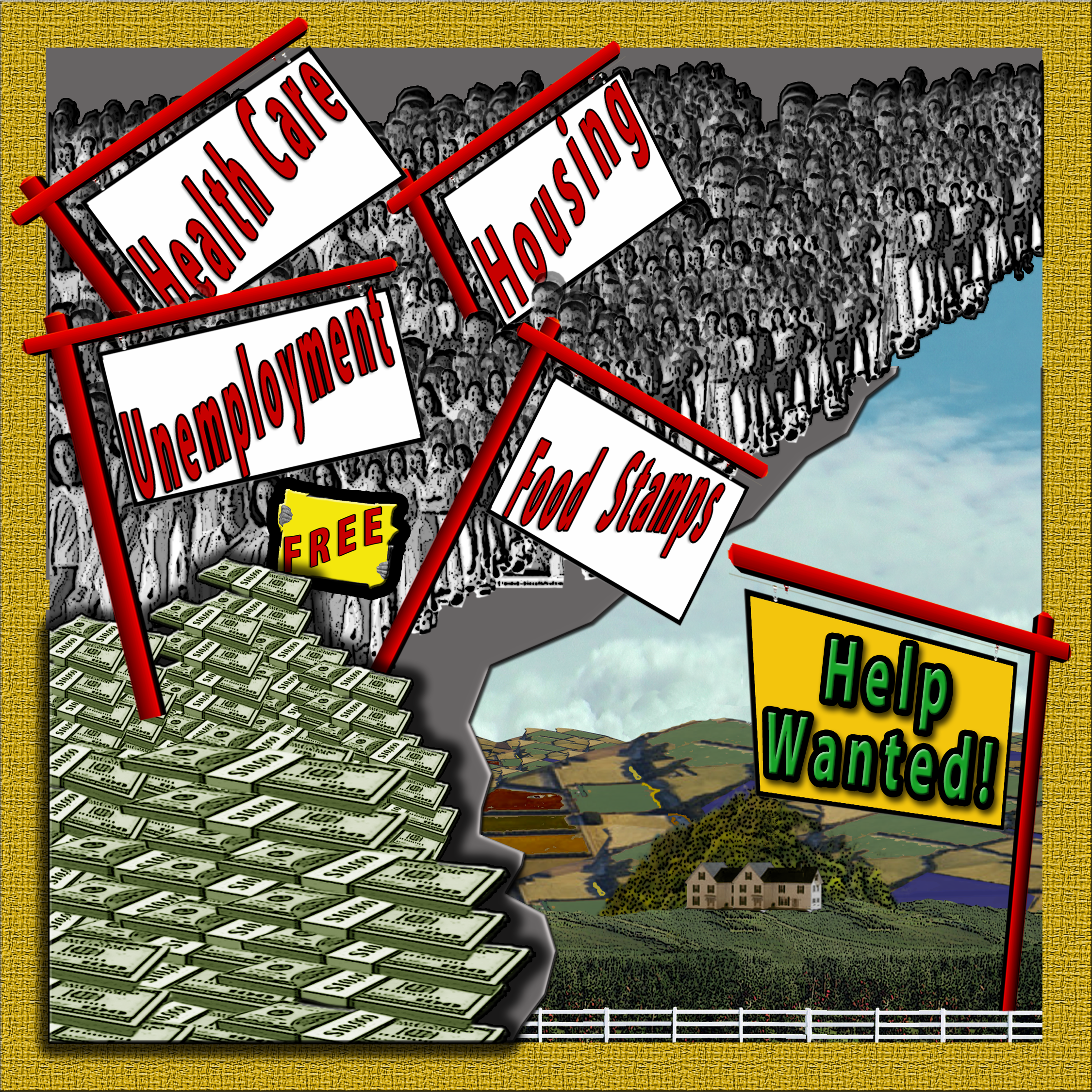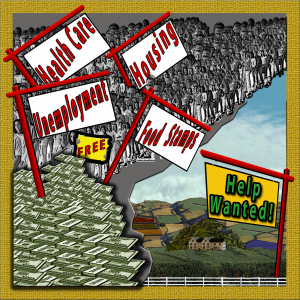
Food Safety Modernization Act
June 18, 2015
DARK Act
July 9, 2015Food Chain Radio Show #1019
Michael Olson, Author & Urban Farming Agriculturalist
Farm’s Labor’s Lost – Farm Labor
Where have all the farm workers gone?
Guest: Bob Martin, GM Rio Farms and Butch Lindley, Partner J&L Farms
While participating in the recent Silicon Valley AgTech Summit, I decided to sit in on an adjacent “Farmers Talk” session featuring, among others, Steinbeck Country farmers Chili Bob Martin and Butch Lindley.
‘Sounds like a farmer gripe session,’ I thought, ‘ and what could possibly be more fun?’
Sure enough, the session opened with a group discussion of the obstacles farmers must overcome to grow and process the food we eat. But of all the obstacles held up, one stood above all else, as related by Butch Lindley:
“Can’t say as though I’ve ever seen anything like it,” he said. “A twenty-acre ranch of prime lettuce, worth around $400,000, going unharvested because there was just nobody to harvest it!”
In fact, many farmers are reporting their worst labor shortage ever. Even the conservative Western Growers Association is reporting a 20% drop in laborers this year alone.
But if one looks at the other side of the labor equation, conditions are equally devasating. With 93 million Americans, give or take, having dropped out of the labor force, and tens of millions of immigrants pouring across the border, there would seem to be a huge reservoir of labor available to agriculture, but that labor is no where to be hired.
That so many have no work, and that so many workers are needed, lead us to ask…
Leave a comment below: Where have all the workers gone?
Tune in here, for the syndicated Food Chain Radio Show #1019 June 27, 2015 Saturday 9AM Pacific





4 Comments
I ask:
Do YOU know anyone who would do that work?
I know some that would (and do), and many that do not (and would not.)
In general, only work on “organic” farms for human-respectful employers (not necessarily a one-to-one correspondence, by the way) is desirable. Chemical and mechanized farming powered by dis-empowered cheap labor has created the myth that the “cost” of food is low. If we want to have a sustainable food production system powered by farmworkers who choose to do so other than those whose only other alternative is a life of early death for themselves and family members in another country, we are going to have to be willing to pay more for our food. Second-and-later generation “Americans” simply do not do farm labor that immigrants do at the pace or under the conditions that they do.
Bullpucky!
When I was 21 and in dire need I saw a job posting at the old Employment Development Department for a strawberry picker. I had to ask one of the (Ca gov) employees for a referral to the job and she declined saying that it was hard work and the farmers wanted someone with “experience”. A short time later I got a job in a large chain hotel in Santa Cruz washing dishes side-by- side with a gaggle of illegal aliens from Mexico. I kept that job for almost a year and then got a job in a dangerous wood products manufacturing factory that burned all the way to the ground.
The idea that Americans won’t do those jobs is a myth, even in California. The truth is, the farmers like disadvantaged workers, like people without immigration documents, so they can pay them less and don’t have to about complaints to OSHA or fair labor practices.
Here is my suggestion to farmers:
1. Quit whining!
2 Show some gratitude for the taxpayer susidized water.
3. Mechanize
4 if you can’t mechanize, grow another crop.
5 Grow higher value crops – we can live without lettuce, strawberries, and artichokes.
6 Use more efficient, and cheaper, methods to water your crops. Israel can do it, so can you. I water all my plants with dirty dishwater, complete with food particles and floating oils (olive, canola, butter, etc.) and they grow just fine.
7. Pay your employees better.
8 Advertise job openings, including pay scales, where people that are literate actually look for jobs, like Craigslist.
9. Improve working conditions worker safety.
10. Finally, quite whining, it’s unAmerican.
This from Walt regarding his stint as a farm laborer, which I find to be most appropriate…
I was born to a farming family in 1953 on the Eastern Shore of Maryland. My dad had a dairy, but his grain operation grew every year. By the 1970’s he was tilling 4,500 acres. I got a degree in Agronomy from the University of Maryland in 1975, and when I returned home, worked for my dad for several years until I decided I needed to leave the nest and work a neighboring farmer named Dwight Rath.
Dwight had 3,000 acres of corn, soybeans and wheat. After a year of working for him, I got to know him very well and we became good friends. Dwight had a masters degree from Cornell University and was about ten years older than me. I introduced him to some friends of mine at the Chicago Board of Trade who he used to trade with.
When I started my second year with Dwight, we had a conversation about my being a laborer under his employ. I pointed out that I knew how to operate every piece of equipment he had, knew how to set a planter or combine, had a CDL license and could drive his tractor trailers and deliver corn to the mill all winter, had a degree in Agronomy, could talk about any subject with him including soil fertility, soil chemistry, soil biology, knew and understood the market (and had in fact introduced him to his current broker), and had all the skills necessary to manage a farm that he had. In short, I was as skilled a laborer as he would ever hire and in exchange for this I was making $7 an hour.
I asked him what was my future if I worked for him as a laborer say for another 10 years. He smiled and said I might make $8 and hour.
I told him I had just been to Wilmington (a city) to seek possibly employment with a construction company. They told me I was unskilled as a construction laborer so they would have to start me at an unskilled labor rate. The rate would be $10 an hour.
In other words, as the most skilled agricultural laborer possible I was making $7 an hour, but I could leave the farm and go to a construction site and start as an unskilled laborer for $10 an hour. I asked him what should I do. He smiled and said, “This is why farm boys leave the farm.”
As much as I loved him, I gave him my notice.
That was 30 years ago.
Walt
I see my comment is in moderation.
Let me add that I was with a friend who also wanted the strawberry picking job. He ended up at the same dangerous woodshop that burned down. He got a job packing Brussel sprouts at the old plant in Santa Cruz. Later he went went to Washington state to pick apples, came back to Ca to work as a tree trimmer/cutter – an extremely dangerous job, then got a very cush job doing the same thing for a very large Bay Area city. I later worked for a local employment agency doing various gigs at Liptons, Wrigleys, Harmony Foods,etc. you name it I did it. I even worked as a graveyard shift janitorial worker. I eventually got smart and went back to school to get a degree and a career, now ended, in the high tech industry. Americans will do, and currently do, all those jobs.
Ben